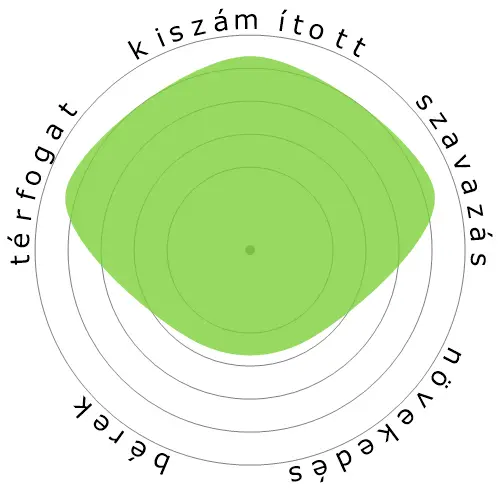Középiskolai tanárok, kivéve a speciális és szakmai/technikai oktatást.




Az emberek ezt is megtekintették
Számított automatizálási kockázat
Minimális kockázat (0-20%): Ebben a kategóriában a foglalkozások automatizálásának alacsony a valószínűsége, mivel általában összetett problémamegoldást, kreativitást, erős interperszonális készségeket és magas manuális ügyességet igényelnek. Ezek a munkák gyakran bonyolult kézmozgásokat és precíz koordinációt igényelnek, ami megnehezíti a gépek számára a szükséges feladatok reprodukálását.
További információ arról, hogy mi ez a pontszám, és hogyan számítják ki, elérhető itt.
Felhasználói szavazás
A látogatóink szerint alacsony az esélye annak, hogy ezt a foglalkozást automatizálni fogják. Ezt az értékelést tovább erősíti a kiszámított automatizálási kockázati szint, amely 16% esélyt becsül az automatizálásra.
Mit gondol, milyen kockázatai vannak az automatizációnak?
Milyen valószínűséggel fogják Középiskolai tanárok, kivéve a speciális és szakmai/technikai oktatást. robotok vagy mesterséges intelligencia helyettesíteni a következő 20 évben?
Érzelem
A következő grafikon mindenhol szerepel, ahol jelentős mennyiségű szavazat áll rendelkezésre, hogy értelmes adatokat lehessen megjeleníteni. Ezek a vizuális ábrázolások az időbeli felhasználói szavazási eredményeket mutatják, jelentős jelzést adva a hangulat trendjeiről.
Érzelem az időben (évente)
Növekedés
A 'Secondary School Teachers, Except Special and Career/Technical Education' munkahelyi nyitások száma várhatóan 0,6%-vel csökken 2033-ra.
Teljes foglalkoztatottság és becsült állásnyitások
A frissített előrejelzések 09-2025 időpontban esedékesek..
Bérek
A(z) 2023-ban a 'Secondary School Teachers, Except Special and Career/Technical Education' éves középfizetése 65 220 $ volt, vagyis 31 $ óránként.
'Secondary School Teachers, Except Special and Career/Technical Education' magasabb összeget kaptak, mint az országos mediánbér, ami 48 060 $-n állt.
Bérek az idők folyamán
Térfogat
2023 időpontjában 1 045 170 ember dolgozott 'Secondary School Teachers, Except Special and Career/Technical Education' munkakörben az Egyesült Államokban.
Ez körülbelül a 0,7% -át képviseli az országban foglalkoztatott munkaerőnek.
Másképp fogalmazva, körülbelül minden 145. ember 'Secondary School Teachers, Except Special and Career/Technical Education'-ként dolgozik.
Munkaköri leírás
Tanítson egy vagy több tantárgyat középiskolás diákoknak.
SOC Code: 25-2031.00


Megjegyzések
Leave a comment
Due to remote learning and using similar designs that you mentioned, we have seen a 210% spike in high school drop outs, a 600% up shot of kids having at least 2-3 failing grades, and a gap between students who do not have access to tutors, internet or computers (or all three). A robot cannot tell an elementary student to reengage their students, let alone the sheer horror of classroom discipline being thrown out. Also, lets be real honest with secondary students, if they are given a generic problem trust me they will plagiarize and copy that down (just look at quizlet, or "write my paper" for proof). A human being needs to see if a student "gets" what is going on. A Teacher needs to have group interactions (and trust me you cannot do any sort of interactions with remote even with current programs- students just shut their cameras and mute themselves). Unless you are suggesting that a "few" will benefit from this dystopia, if so thank you Nancy Devos for your insight, but we educate everyone, and not the 1%.
Do you think the software being used led to those changes or the pandemic and economic downturn itself?
Easy to pass judgment when you have already drawn your conclusions. I've taught off and on since 2008 (mostly on, mostly secondary). Quizlet is the worst example you could provide of instructional technology we could employ to help all students.
When you discuss the one percent, you highlight a certain security the wealthy have that leads to less interruptions of education and that's a fair point. But I am not trying to describe a dystopia, but rather a better way to differentiate and tailor student learning to their particular needs, desires, strengths, and weaknesses.
Much of what effective teachers do is driven by inputs, points of data, about their students and their teaching. A properly designed system could analyze those inputs and apply strategies to intervene. It doesn't really matter the input, either.
Now that we are rolling out SEL technologies to help our kids, language translation applications that can help English learners, standards-based, interactively branching assessments and activities, the amount of information received is nothing trivial. The digital divide does truly make this a difficult prospect for some students, but that's not the question we are discussing here. Can teachers be replaced by "robots" in the future? Yes. Nothing would be more student-centred.
If the argument is about the socialization of students, that's not facilitated by teachers. It's actually stunted. Imagine learning plans that don't waste time with sages on stages. Imagine a truly adaptive system to check for understanding and intervene. Imagine that happening simultaneously for all students without the interruptions all teachers face daily just trying to teach. I realize virtual, and hybrid, learning did not go well for all students, but it was year one...something never attempted, and there was a society gone wild coupled with the inexperience of systems, personnel, and students.
I love teaching. I take it personally. But, if students were able to learn better from a robot than from me, I wouldn't take it personally. I'd celebrate it.
Learning with a teacher can mean a number of scenarios, including utilizing the learning software you mentioned.
The assurance of having someone who knows more than you, or at least knows where to find answers and explain them, will result in teachers have a very secure job.
I haven't even mentioned the emotional support and connection that makes a learning environment better, something I don't foresee AI replacing because seeing assuring words pop up on my screen is not the same as hearing it from a teacher, who is making eye contact with me and using body language.
Hagyjon egy választ erről a foglalkozásról